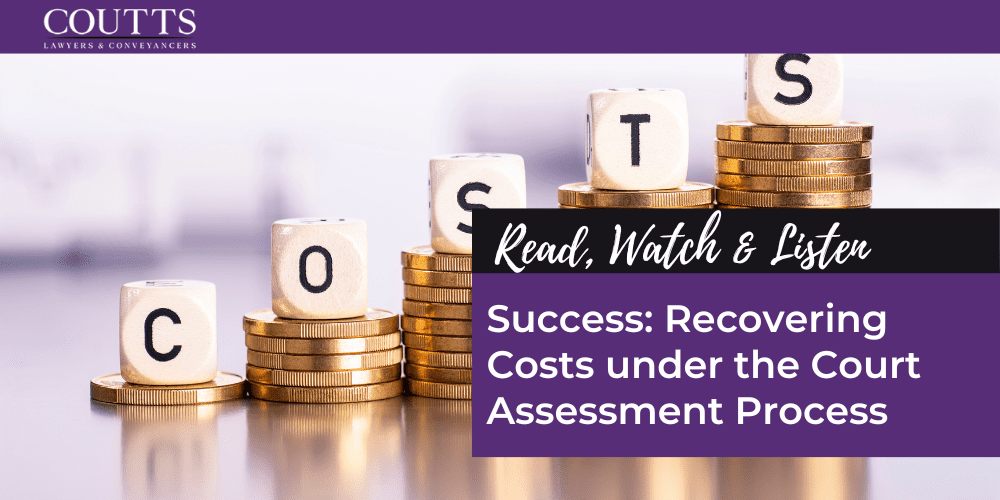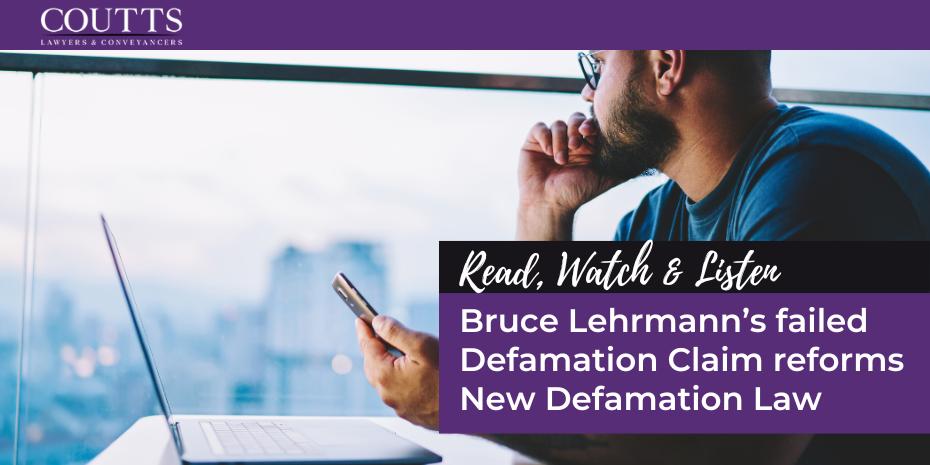KEY TAKE-OUTS
- This blog is a follow up to a blog we posted on the same case in December 2021.
- Coutts’ successfully obtained a costs assessment decision in favour of our clients.
- Generally, a client can expect to recover between 60-80% of its incurred legal fees in the event of a costs assessment.
- Coutts’ client was awarded a costs assessment totalling 92% of its incurred legal costs and was paid in full by the Other Party without the need for enforcement measures.
Background: Breach of contract dispute
Recently, Coutts’ Commercial Litigation team achieved success for one of its clients in a dispute over costs.
The matter originated as a claim against our client for breach of contract allegations. Our client did not believe they had breached the contract and wanted to defend the claim. Given the stringent timeframes of the litigation process, our client was required to respond and participate in the proceedings. As a result, our client incurred legal fees.
What does it mean to be awarded costs?
Following the hearing of the substantive matter, the Court found that our client did not breach the contract for services and given that our client had incurred fees to defend claims which were brought against them wrongly, the Court made orders for the other party to pay the legal fees of our client on a basis which was ‘as agreed or as assessed’ as opposed to a monetary figure. Despite offers passing between the parties initially to resolve the costs dispute, the other party refused to pay our client’s fees.
As a result of the parties being unable to reach an agreed position on costs, our client had no other choice but to apply to the Supreme Court for Cost Assessment.
What is cost assessment?
The costs assessment process involves thoroughly reviewing the file and all the legal work undertaken on the matter and determining the ‘fair and reasonable’ fees for the matter. This will result in a monetary order being made which will allow the successful party to enforce the judgment through methods such as garnishee orders.
An application for cost assessment is made to the Supreme Court for a cost assessor (independent legal professional) to be appointed to assess an appropriate monetary amount for payment.
Parties are able to communicate with the cost assessor and this is generally done so through written communication. Additionally, the cost assessor must allow parties reasonable opportunities to make submissions in regard to the assessment. Some common objections include that the costs claim exceed the costs incurred.
What does a cost assessor consider?
There are several matters which a cost assessor will consider when making a determination, such as:
- Whether the work was carried out was reasonable;
- Whether the work was carried out in a reasonable manner;
- Whether the costs are fair and reasonable considering the work performed. This will be determined with consideration given to:
- The works compliance with relevant legislation and legal professional rules;
- Cost disclosures and/or agreements;
- Relevant advertising made about the lawyers costs and skill;
- Skill, labour and responsibility shown by the lawyer;
- Whether the work performed was within the scope of the legal retainer;
- The complexity of the matter;
- The quality of the work;
- The time frame the work was completed in; and
- Any other matters the assessor sees relevant.
Success: The Outcome of Costs Assessment in the Supreme Court
Our application requested costs totalling just under $93,000. Coutts made submissions to the cost assessor regarding the costs to be assessed and a Bill of Costs was submitted for consideration. The Other Party also made submissions regarding their disputed cost entries and seeking a significant reduction of our client’s costs. The Costs Assessor reviewed the material presented by the parties and ultimately determined that the fair and reasonable costs were in the range of $86,000, being 92% of our client’s claimed costs. We consider this a successful outcome as, generally, a client can expect to recover only between 60-80% of the costs incurred in a party/party costs order.
What made this case even more successful was that following the decision of the Costs Assessor, the other party paid the ordered amount of the costs decision plus cost assessor’s fees directly to our client, meaning that our client did not have to incur further costs in enforcing the judgement
How we can help you?
If you are in a situation where costs must be assessed, we can assist you with completing the relevant applications. Additionally, we can help you make submissions to the costs assessor and provide you with professional advice regarding your claim and the options available.
Contact our commercial team for more information on cost assessments.
For further information please don’t hesitate to contact:
Contact Coutts today.
This blog is merely general and non-specific information on the subject matter and is not and should not be considered or relied on as legal advice. Coutts is not responsible for any cost, expense, loss or liability whatsoever to this blog, including all or any reliance on this blog or use or application of this blog by you.



